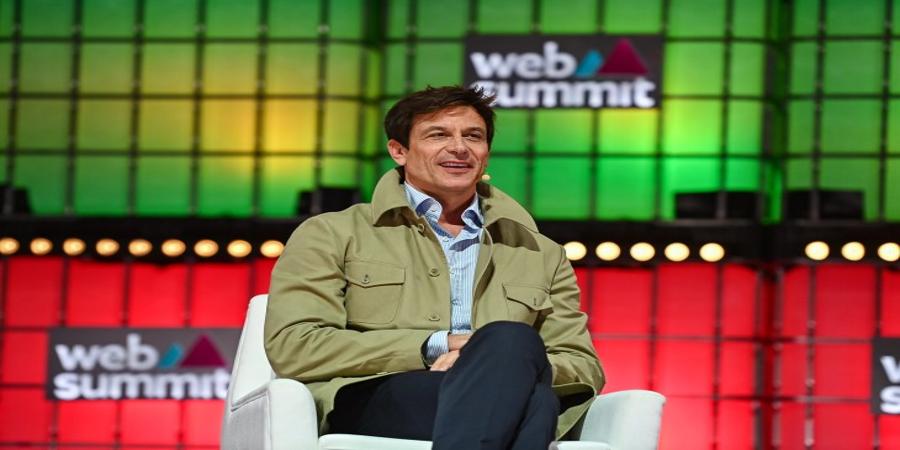Toto Wolff, the 50-year-old Austrian chief executive, team principal and part-owner of the Mercedes Formula 1 team who was recently described by the New Yorker as someone who might breeze “past you in the airport, smelling good, wearing loafers and no socks,” talked openly yesterday about his team’s terrible, no-good year. Sitting with Oliver Steil, the CEO of the German company TeamViewer, a popular maker of remote support software, Wolff also described how the troubled racing team is counting, in part, on TeamViewer’s tech to give it an edge in its bid to recapture its former glory.
The two were speaking at the Web Summit conference in Lisbon, and Wolff was cheered when he appeared before the crowd, owing in no small part to “Drive to Survive,” the Netflix series that has made him famous. (He finds this amusing, recounting to New Yorker writer Sam Knight how a young woman threw herself through the open window of his car to get her picture taken.)
Wolff also immediately acknowledged the obvious. “We won the championship eight times in a row,” he said, “but that is the past.” Mercedes, he continued, “just got the physics wrong . . . and got the concept of the car not in the right place,” he said, referring to the design of its floor, which he has previously pointed to as the root of the team’s lackluster year. (Every few years, the F1 teams — there are currently 10 altogether — are forced by the body overseeing Grand Prix racing to redesign their cars.)
Indeed, it’s largely because it “takes a a long time to unwind things that are built into the car,” said Wolff, that his team last year turned to TeamViewer, a 17-year-old, publicly traded company whose software can remotely access and connect any computer, tablet, laptop, mobile device, or IoT endpoint like an industrial machine — or race car — to allow the remote control, management, and monitoring of these devices.
It’s a match made in heaven, suggested Steil, who said that TeamViewer is working closely with the Mercedes-AMG Petronas team to make it more efficient, including running lab tests out of hours and supporting the trackside crew via remote engineers.
“We really try to go through a system like we have at Formula 1 like a team. We see the different parts, and we see what can we do differently if we connect in real time, in addition to what we do maybe on trackside and in the back office. We’re really working through the different parts of the organization, on testing obviously, production maintenance, wind tunnel, all these kinds of applications where we try to see where can be better . . .”
Wolff chimed in separately to paint the bigger picture. “We are racing 23 times around the world, around the globe [during the racing season], and our core team is just 90 engineers [with] 2,000 back at the factory,” including 1,000 people focused on the chassis side and another 1,000 focused on the engine.
“Operating in the field, or we call it surgery in the field,” Wolff said, “is not always trivial because if you open up an engine or a complicated cooling system, you want to have the resource from back at home, and TeamViewer is the only technology that allows us today in having the guy back at home look through the same borescope into the cylinder head, then [help] the mechanic on the field.”
As an added and not inconsequential benefit, said both men, the partnership cuts down on emissions because it means moving fewer people around at a time when Mercedes is focusing increasingly on sustainability. In fact, Wolff said, the team has cut its emissions by nearly 90% in recent years. “It is our responsibility to show our global audience of billions of spectators that if we can do it, everyone can do it,” he said.
Certainly, the appearance was a great moment for TeamViewer, whose other clients range from telecommunications companies to the fast-food franchise Wendy’s. Surely, for a company promising great efficiency to its customers, there’s nothing like having a revered Formula 1 team boss sing your praises.
Of course, what racing fans want to know is whether the tech will give Mercedes — which has yet to win a race in 2022 — enough of an edge to overcome the team’s arch-rivals, Red Bull and Ferrari.
While Wolff is looking to “tomorrow,” as he said yesterday, it could take a while, even with the faster feedback loops that TeamViewer’s technology provides the team. As he recently told the outlet RacingNews365, Mercedes is still “eight to 10 months” behind Red Bull in terms of Formula 1 development after its frustrating 2022 season.
There is definitely a challenge,” he added, “but we are playing the long game, all of us.”
The intense rivalry between the two teams, though perfect for television, remains very real in the meantime. As the New Yorker piece observes, of the 10 team principals in the sport, only Wolff and Christian Horner, who runs the Red Bull team, have ever won a world championship, and they appear to truly loathe one another.
Earlier this year, reports Knight, Horner referred to Wolff, who lives in Monaco, as a tax exile who — he added disparagingly — runs his team remotely. Wolff, in conversation with Knight, said of Horner in turn, “He’s just so simple.”
Source @TechCrunch



